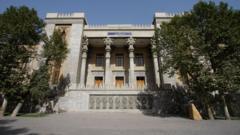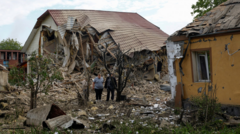As tensions continue over Iran's nuclear program, Ayatollah Ali Khamenei voices skepticism about reaching a satisfactory agreement following contentious discussions.
**Khamenei Skeptical of US Nuclear Deal Progress Amid Tensions**

**Khamenei Skeptical of US Nuclear Deal Progress Amid Tensions**
Iran's Supreme Leader expresses doubt about the potential success of ongoing nuclear negotiations with the US, citing excessive demands on uranium enrichment.
Iran's Supreme Leader, Ayatollah Ali Khamenei, has publicly cast doubt on the possibility of reaching a new nuclear agreement with the United States, describing the demands on uranium enrichment as "excessive and outrageous." Speaking during a ceremony in memory of late President Ebrahim Raisi, Khamenei reflected on the stalled negotiations and their implications amidst escalating tensions.
"We don't think it will lead to any outcome. We don't know what will happen," Khamenei stated, expressing his concerns about the direction of the talks. This comes on the heels of remarks made by US President Donald Trump, who claimed Iran had somewhat agreed to terms following four rounds of negotiations mediated by Oman. However, Iran's chief negotiator dismissed the US assertion that they must commit to halting enriched uranium production.
Trump previously withdrew the US from the 2015 nuclear deal which aimed to limit Iran's nuclear capabilities, warning of military action from both the US and Israel should negotiations fail. Conversely, Iran maintains that its nuclear endeavors are solely for peaceful purposes and vehemently denies any intentions to develop nuclear weapons. Nevertheless, the country has violated existing agreement constraints in response to severe US sanctions and has accumulated enough highly-enriched uranium that could theoretically construct multiple nuclear bombs.
During his remarks, Khamenei highlighted the hardline stance taken by Raisi, who categorically rejected direct dialogue with the US while in office, emphasizing a refusal to let external threats dictate Iran's negotiating position. He also criticized former US policies under the Trump administration, advising that the American negotiators should refrain from making what he described as "nonsensical remarks."
As the negotiations continue, US Special Envoy Steve Witkoff reaffirmed the US position against allowing any form of Iranian enrichment, arguing it poses a significant threat. In turn, Iranian Foreign Minister Abbas Araqchi labeled the US expectations as unrealistic, underscoring the inextricable connection between Iran's nuclear advancement and its national interest.
The fragile landscape of diplomacy surrounding Iran's nuclear ambitions is further complicated by ongoing threats and mixed messaging from both sides, leaving stakeholders uncertain about the future of negotiations and potential compromises.




















